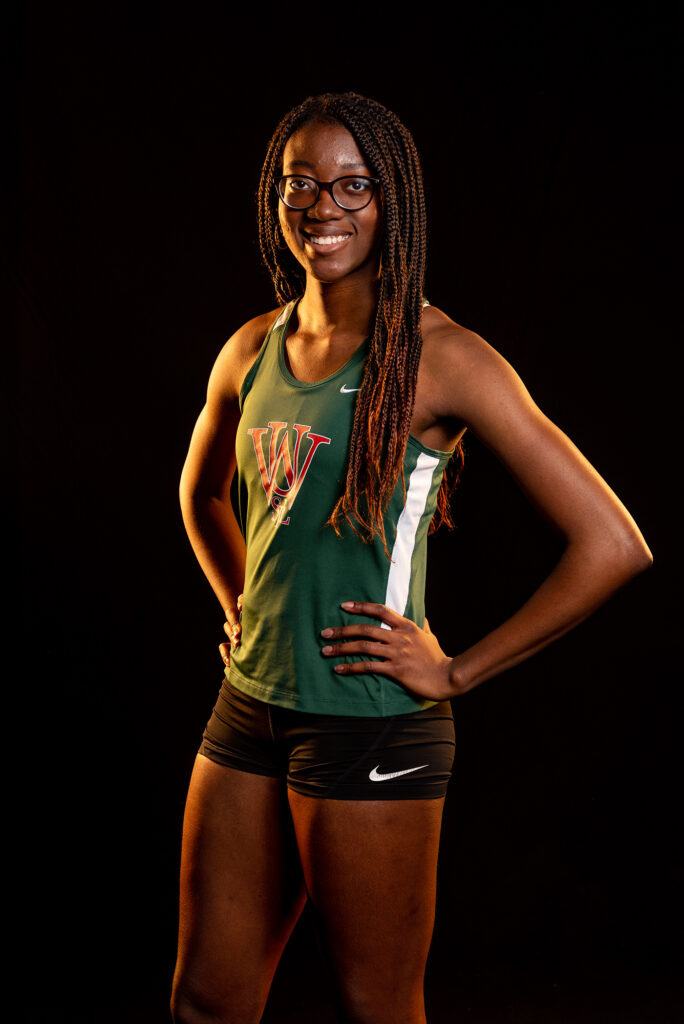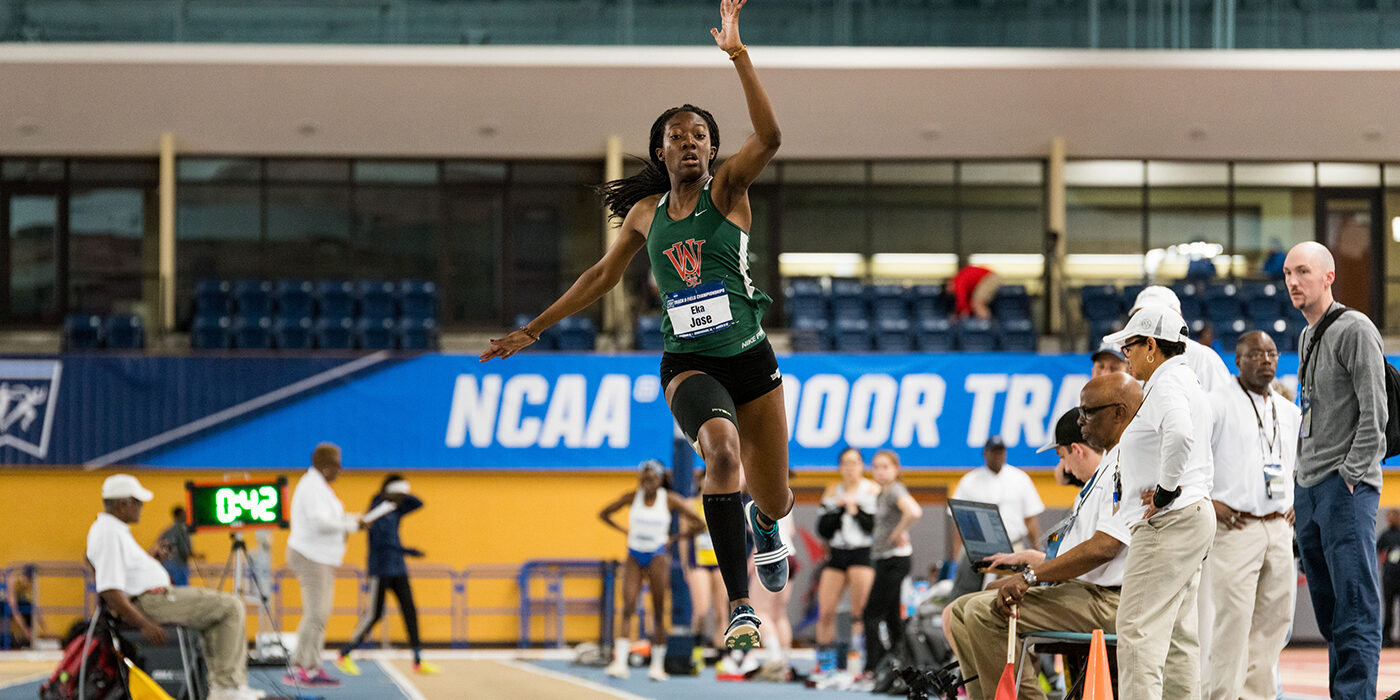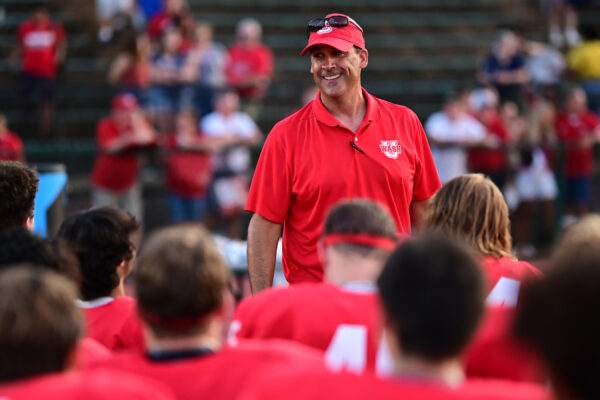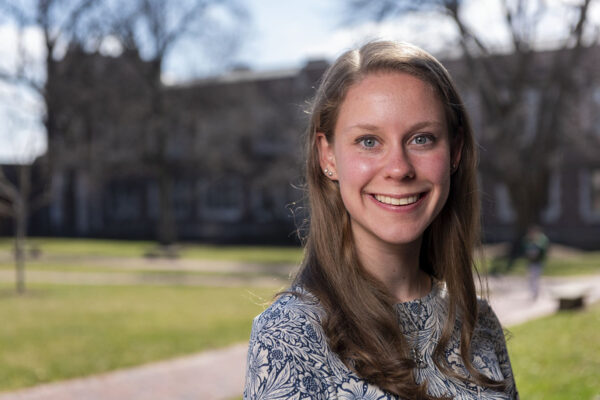In eighth grade, Eka Jose, AB ’21, decided it was high time to plan the rest of her life. Jose had always been fascinated by the human body, so she would be a doctor. And because she loved school, she would attend one of the best for pre-medical studies, Washington University in St. Louis.
“From that point on, everything I did academically was about reaching that goal,” says Jose of Kansas City, Missouri. “You can definitely call me a planner.”
And yet serendipity has contributed as much to Jose’s success as her steely determination. Jose didn’t know it yet, but she had a gift for leaping long distances and WashU, it so happened, boasted a top track & field program.
“I was late to the sport, and it never occurred to me it was something I could do at WashU,” Jose recalls. “But when I saw how successful WashU students were in the classroom and on the track, I figured, ‘Why not go for it?’ How cool would it be if I had the opportunity to do both and to succeed at both.”
And she did. Jose won two NCAA championships in the triple jump and notched six All-America honors. She also excelled as a student, graduating in May with degrees in anthropology and biology in Arts & Sciences. She earned a 3.94 grade point average, served as a pre-health peer mentor and conducted research in the lab of Robert Kranz, professor of biology in Arts & Sciences.
In recognition of her accomplishments, Jose has been named a top nine finalist for NCAA Woman of the Year, an elite honor for athletes who have demonstrated excellence in academics, athletics, service and leadership. Jose was selected from a field of 535 nominees and follows in the footsteps of alumnae Lizzy Crist and Elizabeth Phillips who were selected as NCAA Woman of the Year in 2017 and 2012 respectively.

“During her time at Washington University, Eka exemplified what it meant to be a scholar-champion,” says Anthony J. Azama, associate vice chancellor for student affairs and the John M. Schael Director of Athletics. “Eka is an excellent competitor, a supportive teammate and just a great person. When I’m making decisions, I’m always asking, ‘How will this enhance the student experience and how will this help us compete for championships?’ Eka’s perspective and candor have been invaluable in those areas.”
Jose won both of her two championships in 2019, leaping 12.16 meters at the NCAA Division III Indoor Track and Field National Championships and then 12.52 meters at NCAA Division III Outdoor Track and Field National Championships. She also was named the 2019 Most Outstanding Women’s Field Performer by the U.S. Track and Field and Cross Country Coaches Association (USTFCCCA).
Beyond the titles, Jose also is proud to be the co-founder of the Washington University Black Letter-winning Athletes Coalition, a group devoted to creating community for Black student-athletes.
“We initiated conversations with administrators about the importance of staff diversity, as well as mental health, personal and professional development resources,” says Jose, also a recipient of the Shepley Outstanding Senior Award in 2021. “Most importantly, we worked to create a safe community for Black athletes to support one another and be able to harness their full academic and athletic potential. The work is far from over, but I’m optimistic that we were able to set a good foundation.”
Jeff Stiles, the track & field head coach, says the COVID pandemic and aftermath of the George Floyd murder took a toll on athletes. Jose — soft-spoken, selfless and mature — emerged as the leader her teammates needed to navigate the difficult 2020 and 2021 seasons.
“People were devastated when the 2020 championships were canceled,” Stiles recalls. “All of the sudden, everything gets taken away. And here’s Eka, who just lost her chance to defend her title, taking care of her teammates. Eka kept her finger on the pulse of the mental health and welfare of the team and always put them first.”
Today Jose works as a scribe at a hospital that serves low-income patients in Memphis. She has put away her spikes and has taken up weight lifting and rock climbing. Next year, she will attend medical school and hopes to become a primary care physician. One day, perhaps, she will open a clinic in Nigeria where she lived until she was 7 years old.
“I used to think I wanted to be a heart surgeon, but now I’m interested in serving under-resourced and under-served populations,” Jose says. “To do that well, you really need to form long-term relationships with patients and develop a close rapport with the community. That’s why primary care seems to be the most fitting direction for me. That’s the plan — for now.”



